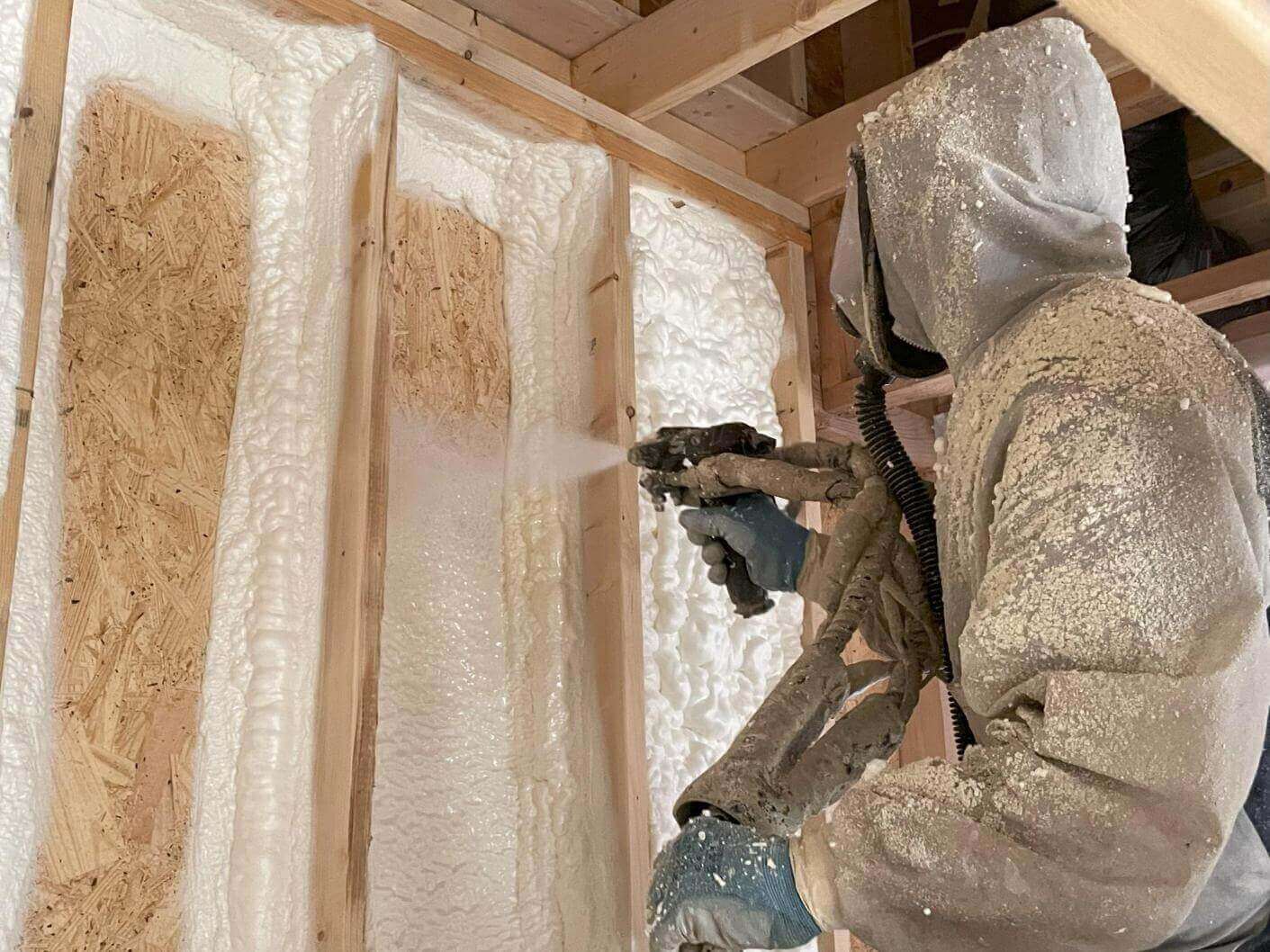Leading Applications of Spray Foam for Residential and Commercial Properties
Leading Applications of Spray Foam for Residential and Commercial Properties
Blog Article
Spray Foam: The Ultimate Option for Air Sealing and Insulation
Spray foam insulation has actually arised as a leading solution for reliable air securing and thermal insulation, using a special mix of residential properties that set it apart from typical methods. Understanding the full range of its benefits, installation procedures, and comparisons with various other insulation kinds is crucial for making informed decisions.
What Is Spray Foam?
Spray foam is a versatile insulation product that incorporates the principles of air sealing and thermal resistance to enhance power performance in structures. Made up mostly of polyurethane or other comparable compounds, spray foam is applied as a liquid that increases upon contact with surface areas, developing a solid, continual layer of insulation. This special residential or commercial property permits it to load spaces, splits, and gaps that traditional insulation products may forget, offering an exceptional air seal.
There are 2 main sorts of spray foam: open-cell and closed-cell. Open-cell spray foam is lighter and much more flexible, using exceptional sound absorption and a lower R-value per inch - Spray Foam. In comparison, closed-cell spray foam is denser, offering a higher R-value, moisture resistance, and added structural honesty to building elements
The application process commonly includes customized tools, ensuring a smooth application that sticks to various substrates, consisting of steel, concrete, and timber. This flexibility makes spray foam suitable for both brand-new building and constructions and retrofitting existing structures. Its ability to produce a closed obstacle dramatically contributes to lowering power consumption and enhancing interior air top quality, thereby making it a favored choice among property owners and home builders alike.
Benefits of Spray Foam Insulation
One of one of the most significant benefits of spray foam insulation is its outstanding capacity to develop a continual air barrier, which properly reduces energy loss. Unlike typical insulation products, spray foam broadens to fill fractures and gaps, making certain that air leakage is significantly lowered. This characteristic not only improves power performance however likewise leads to reduce energy bills gradually.
Furthermore, spray foam insulation provides exceptional thermal resistance, adding to a more secure indoor setting. Its high R-value per inch enables efficient insulation in confined areas, making it perfect for attic rooms, walls, and crawl areas. Additionally, the moisture-resistant properties of spray foam assistance protect against mold and mold growth, advertising healthier living conditions.
Another critical advantage of spray foam insulation is its sound-dampening top qualities (Spray Foam). It properly minimizes noise transmission in between areas, producing a quieter and much more comfy home environment. The durability of spray foam likewise sticks out, as it does not droop or clear up over time, keeping its efficiency throughout its lifespan
Just How Spray Foam Functions
Recognizing just how spray foam insulation functions is necessary for valuing its effectiveness in air securing and thermal resistance. Spray foam insulation includes two primary parts: isocyanate and polyol material. When these elements are combined, they go through a chemical response that creates the product to broaden quickly, producing a thick foam that fills spaces, cavities, and cracks.
As the foam increases, it complies with surfaces, forming a closed seal that significantly minimizes air seepage. This why not look here characteristic makes spray foam insulation extremely effective at stopping drafts and dampness penetration, which can result in power loss and damage over time. In addition, the closed-cell variant of spray foam supplies premium thermal resistance as a result of its inflexible framework, properly minimizing warm transfer.
The unique see residential properties of spray foam permit it to comply with uneven surface areas, ensuring detailed protection and a smooth barrier. Consequently, spray foam insulation not just improves energy effectiveness however additionally adds to enhanced interior air quality by minimizing the accumulation of irritants and toxins. Eventually, comprehending the mechanics behind spray foam highlights its role as a premium option for insulation and air sealing in both property and commercial applications.
Installment Process Overview

Prior to installment, the space should be adequately cleansed and prepped, guaranteeing that surface areas are without wetness, dirt, and particles. This action is vital because impurities can endanger bond and general performance. When the area is prepared, the application includes mixing both components of the spray foam, which broadens upon call and fills voids successfully.
Educated specialists need to conduct the installment, making use of customized equipment to guarantee consistent protection and ideal density. Security preventative measures, including wearing safety gear and making sure proper air flow, are critical throughout this procedure. After application, the foam usually treatments rapidly, forming a strong barrier that enhances energy performance.
Comparing Spray Foam to Typical Insulation
When evaluating insulation options, spray foam insulation stands out in comparison to typical products such as fiberglass and cellulose. Unlike fiberglass and cellulose, which can allow air infiltration, spray foam broadens upon application, loading spaces and crevices to create an impermeable seal.
In addition, spray foam offers a greater R-value per inch than typical insulation types, providing even more reliable thermal resistance in a thinner account. This characteristic is especially beneficial precede with minimal dental caries deepness. Furthermore, spray foam is immune to wetness and mold and mildew growth, which can be a significant worry with cellulose and fiberglass, particularly in damp settings.
Nevertheless, spray foam insulation usually lugs a greater ahead of over at this website time price than its typical equivalents. Home owners should weigh this first investment versus long-lasting power cost savings and performance advantages. Ultimately, while both insulation types offer their purpose, spray foam emerges as an advanced remedy for contemporary insulation requirements, especially in regards to air securing and thermal efficiency.

Conclusion
In recap, spray foam insulation stands for a very effective remedy for attaining optimal air securing and thermal resistance. Its special homes, including moisture resistance and sound dampening, make it appropriate for different applications in both new building and constructions and retrofitting projects (Spray Foam). Although the initial prices may be higher contrasted to conventional insulation materials, the lasting benefits, such as significant power cost savings and improved indoor air quality, justify the financial investment and highlight its value in contemporary building methods.
Spray foam insulation has emerged as a leading solution for effective air sealing and thermal insulation, providing an unique mix of homes that set it apart from conventional methods.Spray foam is a flexible insulation material that incorporates the concepts of air sealing and thermal resistance to enhance power performance in buildings.When reviewing insulation choices, spray foam insulation stands out in contrast to typical materials such as fiberglass and cellulose. Inevitably, while both insulation types serve their objective, spray foam emerges as a more advanced solution for modern insulation requirements, especially in terms of air sealing and thermal effectiveness.
In recap, spray foam insulation stands for a highly reliable solution for attaining optimal air securing and thermal resistance.
Report this page